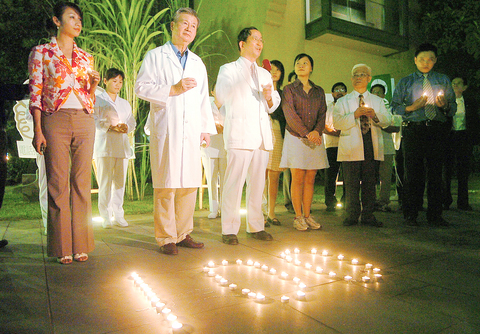The Democratic Progressive Party (DPP) legislative caucus yesterday requested that the pan-blue alliance offer an explanation for their opposition to the long-stalled arms procurement bill.
"While Chinese President Hu Jintao (
The arms procurement bill has been rejected by the legislature's Procedural Committee 36 times since the beginning of this legis-lative term in February.

PHOTO: LIU HSIN-DE, TAIPEI TIMES
The original NT$480 billion (US$15 billion) special arms procurement bill sought to purchase three PAC-3 Patriot anti-missile batteries, 12 P-3C maritime-patrol aircraft and eight diesel-electric submarines from the US.
At the request of opposition parties, the Executive Yuan has removed the NT$133 billion outlay earmarked for Patriot batteries over the next 15 years from the proposal, and included them in the Ministry of National Defense's annual budget instead, lowering the total amount of the special budget from NT$480 billion to around NT$350 million.
Despite the government's concession, the pan-blue alliance remains opposed to the watered-down version of the originally proposed bill.
Citing a recent example of the Taipei City Government's handling of the national flag, Lai theorized that the reason the pan-blue camp keeps opposing the arms procurement plan is to "raise China's national flag and lower Taiwan's."
Lai was referring to a national figure skating competition held at Taipei City's new indoor stadium on Tuesday. While there is a Chinese national flag flying at the venue, Taiwan's national flag is nowhere in sight.
DPP caucus whip Chen Chi-jun (陳景峻) said that the pan-blue camp is joining forces with Beijing because Beijing exerts itself to bully Taiwan not only on the military front, but also on the legislative, scientific and economic front.
Chen said that he would like to ask Taipei Mayor and Chinese Nationalist Party (KMT) Chairman Ma Ying-jeou (
In related news, DPP Legislator Lee Wen-chung (李文忠), who is a member of the legislature's National Defense Committee, yesterday said that his caucus will try to request a special budget or additional budget for Patriot anti-missile batteries this year or make the regular budget request next year. The defense committee recently crossed out NT$10.9 billion of the Patriot missile batteries' secret budget earmarked for next year.
His caucus would also file for a constitutional interpretation from the Council of Grand Justices to rule on the legitimacy of the country's first nationwide referendum.
In the poll, voters were asked to vote "yes" or "no" on whether they agree that the government should purchase more advanced anti-missile weapons to boost the nation's self-defense capabilities.
Although the vast majority of the respondents said "yes," the referendum failed to achieve the 50 percent threshold required to make it valid.
The pan-blue alliance of the Chinese Nationalist Party (KMT) and People First Party (PFP), however, say the invalid referendum represented the public's "veto" of the purchase of Patriot missiles.

A preclearance service to facilitate entry for people traveling to select airports in Japan would be available from Thursday next week to Feb. 25 at Taiwan Taoyuan International Airport, Taoyuan International Airport Corp (TIAC) said on Tuesday. The service was first made available to Taiwanese travelers throughout the winter vacation of 2024 and during the Lunar New Year holiday. In addition to flights to the Japanese cities of Hakodate, Asahikawa, Akita, Sendai, Niigata, Okayama, Takamatsu, Kumamoto and Kagoshima, the service would be available to travelers to Kobe and Oita. The service can be accessed by passengers of 15 flight routes operated by

Alain Robert, known as the "French Spider-Man," praised Alex Honnold as exceptionally well-prepared after the US climber completed a free solo ascent of Taipei 101 yesterday. Robert said Honnold's ascent of the 508m-tall skyscraper in just more than one-and-a-half hours without using safety ropes or equipment was a remarkable achievement. "This is my life," he said in an interview conducted in French, adding that he liked the feeling of being "on the edge of danger." The 63-year-old Frenchman climbed Taipei 101 using ropes in December 2004, taking about four hours to reach the top. On a one-to-10 scale of difficulty, Robert said Taipei 101

MORE FALL: An investigation into one of Xi’s key cronies, part of a broader ‘anti-corruption’ drive, indicates that he might have a deep distrust in the military, an expert said China’s latest military purge underscores systemic risks in its shift from collective leadership to sole rule under Chinese President Xi Jinping (習近平), and could disrupt its chain of command and military capabilities, a national security official said yesterday. If decisionmaking within the Chinese Communist Party has become “irrational” under one-man rule, the Taiwan Strait and the regional situation must be approached with extreme caution, given unforeseen risks, they added. The anonymous official made the remarks as China’s Central Military Commission Vice Chairman Zhang Youxia (張又俠) and Joint Staff Department Chief of Staff Liu Zhenli (劉振立) were reportedly being investigated for suspected “serious

Taiwanese and US defense groups are collaborating to introduce deployable, semi-autonomous manufacturing systems for drones and components in a boost to the nation’s supply chain resilience. Taiwan’s G-Tech Optroelectronics Corp subsidiary GTOC and the US’ Aerkomm Inc on Friday announced an agreement with fellow US-based Firestorm Lab to adopt the latter’s xCell, a technology featuring 3D printers fitted in 6.1m container units. The systems enable aerial platforms and parts to be produced in high volumes from dispersed nodes capable of rapid redeployment, to minimize the risk of enemy strikes and to meet field requirements, they said. Firestorm chief technology officer Ian Muceus said